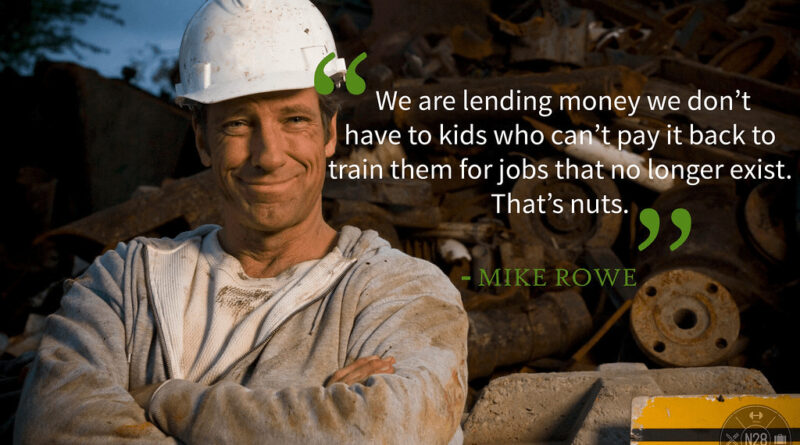Skilled Trade Career Myths
The skilled trade career myths to share with students and parents.
MYTH #1 – YOU CAN’T MAKE MUCH MONEY
FACT: TRADE PROFESSIONALS OFTEN MAKE AS MUCH OR MORE THAN COLLEGE GRADUATES
Here are just a few examples of AVERAGE annual salaries in Pennsylvania:
|
Position
|
Annual Salary
|
|
First-Line Supervisors
|
$77,430
|
|
Brick Masons
|
$59,390
|
|
Tile/Stone Setters
|
$62,220
|
|
Electricians
|
$70,300
|
|
Plumbers
|
$62,040
|
|
Building Inspectors
|
$60,100
|
|
Carpenters
|
$55,850
|
Source: Occupational Employment Statistics (OES), Bureau of Labor Statistics, 2020.
It is important to note that the above averages are only averages! The earning potential for careers in the skilled trades is relatively high! Many tradespeople with expertise in their skillsets and an entrepreneurial spirit can start their own business and earn six figures. Of course, there are also opportunities to advance into management roles as well. Additionally, with the unprecedented current labor shortage, many companies offer sign-on bonuses and other incentives to ensure they fill these essential roles.
According to Stanley Black & Decker’s Makers Index, after five years, an individual who attends trade school and then starts working will be $140,000 ahead on average, compared to a student who attends a four-year college before joining the workforce.
This article details seven specific skilled trade careers that don’t require a college degree and the current salary ranges.
MYTH #2 – SKILLED TRADE JOBS DON’T REQUIRE INTELLIGENCE.
FACT: MANY JOBS IN THE TRADES REQUIRE CREATIVITY, MATH, VARIOUS SOFT SKILLS, AND THE USE OF SOPHISTICATED TECHNOLOGY.
Just because many careers in the construction trades do not require a college degree does not mean they do not need critical thinking. Depending on the role, trade jobs can require detailed knowledge, use of machinery, technology, etc. Even the roles that don’t require math skills, for example, do require a willingness to learn, creative thinking skills, people skills, and a solid work ethic, so the misconception that skilled trades jobs are just a “backup plan” is incorrect.
MYTH #3 – SKILLED TRADE JOBS ARE SEASONAL
FACT: SKILLED TRADE PROS ARE IN HIGH DEMAND ALL YEAR ROUND, AND THE TRADES ARE MORE THAN A “JOB”. THE SKILLED TRADES ARE A TRUE CAREER PATH.
Ask anyone in or around the construction industry. There is a HUGE shortage of skilled tradespeople. We have an estimated 396,000 open positions right now, according to the National Association of Home Builders, and based on data from Generation T, there will be more than three million job openings in the skilled trades by 2028. There are undoubtedly part-time or seasonal opportunities, As with any profession, there are part-time or seasonal opportunities, but the actual dilemma is that companies looking to hire full-time, permanent positions are struggling. The Bureau of Labor Statistics projects a better than average employment rate in the building trades through at least 2026. The only problem is there may not be enough workers to employ.
MYTH #4 – SKILLED TRADE JOBS ARE FOR MEN
FACT: WOMEN NOW MAKE UP 10.9% OF THE CONSTRUCTION INDUSTRY, AND THE NUMBER CONTINUES TO CLIMB.
Historically, the construction industry has been male-dominated, but that is changing. Even as a minority, women are making a difference in construction and challenging stereotypes.
According to the Bureau of Labor Statistics (BLS), the pay gap in the construction industry is the lowest in any U.S. industry. AND, with the industry adding about 400,000 new jobs in the next eight years, that is a lot of opportunity for men and women!
Furthermore, hiring practices within the trades are changing to be more inclusive.
MYTH #5 – SKILLED TRADE JOBS ARE PHYSICALLY DEMANDING
FACT: MANY SKILLED TRADE JOBS REQUIRE PHYSICAL LABOR, WHILE OTHERS ARE MUCH LESS DEMANDING
Many trade jobs require physical labor, but physical work and not sitting in a cubicle every day is an advantage for many people. For anyone concerned about that aspect of the trades, keep in mind that there are hundreds of different opportunities and avenues in the industry. Roles in project or facility management, sales, department leads, design, and production management are just a few areas where you can leverage your skills and knowledge in a physically less intense position.
MYTH #6 – THERE’S LITTLE OPPORTUNITY FOR ADVANCEMENT IN THE SKILLED TRADES
FACT: THERE’S PLENTY OF ROOM FOR ADVANCEMENT AND PAY RAISES IN THE TRADES
With literally hundreds of thousands of current job openings and hundreds of thousands more anticipated, there will also be growth opportunities. Organizations hiring skilled trade workers will also have a steady demand for managers, supervisors, etc. Often, companies will even provide on-the-job training to groom workers to take on higher-level roles or pay for certifications, specialized training, etc.
MYTH #7 – TRADE JOBS ARE NOT FULFILLING
FACT: SKILLED TRADE JOBS ARE EXTREMELY IMPORTANT AND PROVIDE OPPORTUNITIES FOR GREATER SATISFACTION AND FULFILLMENT THAN IN MANY OTHER SETTINGS
Skilled trade jobs often deal with solving real-world problems and helping people. Many trade jobs will always be essential to living comfortably (for starters, think about your home’s plumbing, heating, cooling, etc.).
Additionally, skilled trade work is IMPORTANT. President Biden has called for at least $1.5 trillion for infrastructure construction to address the roads, highways, bridges, locks, damns, harbors, water systems, and airports that have been neglected or only somewhat repaired in the last twenty years.
With so many opportunities for fulfilling careers that offer job security and high growth and income potential, the skilled trade career path provides a valuable alternative to college and student debt. Ready to learn more about local opportunities for apprenticeships, on-the-job training, and more? Contact us today! Skilled Trade Career Myths.
Source: Skilled Trade Career Myths
https://www.techedmagazine.com/category/news-by-industry/
https://ybaworkforcenow.com/seven-myths-about-skilled-trade-careers-debunked/

